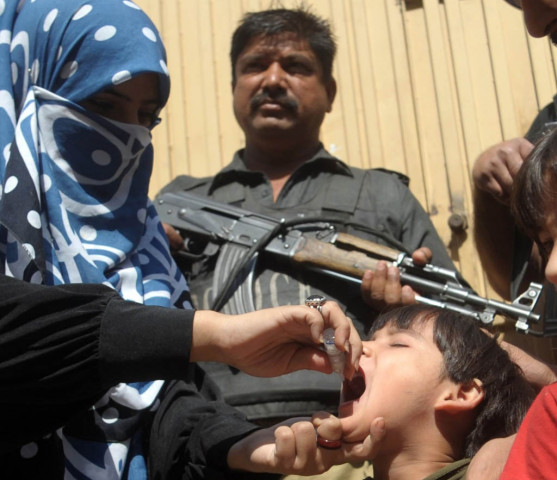Polio travel restrictions
The travel restrictions are a direct result of the export of the polio virus to countries like Syria.

The government has indicated that it will set up polio vaccination counters at airports, seaports and all other border crossings. PHOTO: AFP/FILE

There does not appear to be any global precedent for the quarantine of entire countries (Syria and Cameroon are to be subject to identical restrictions on their nationals). Some countries, such as India and the Kingdom of Saudi Arabia, already require valid polio vaccination documents, but the rest of the world has never had to deal with the challenge of polio-endemic countries reinfecting countries that had been declared polio free, before.
The WHO report sets out a number of conditions to be met before it reconsiders its recommendations, the first of these being that Pakistan officially declare at head of state level that the interruption of poliovirus transmission is a national public health emergency. We are also required to put in place a system that ensures that travellers are provided with an International Certificate of Vaccination or Prophylaxis as specified in Annexe 6 of the International Health Regulations (2005) as proof of vaccination. The implications of the WHO report are far-reaching and the government cannot claim it was not forewarned.
Forewarned it most certainly was and there have been indications that the WHO was considering travel restrictions at least for the last three years. One would have reasonably expected that the government would have done some contingency planning but that does not appear to be so. An official of the Ministry of National Health Services Regulation and Coordination (NHRSC) speaking to this newspaper on May 1 admitted that the government had not yet worked out a strategy as to how to deal with restrictions if they were imposed. On top of this, the prime minister’s focal person on polio displayed an astonishing ignorance of the matter for which she is the focal person by saying that “We have clearly told them (the WHO) that 90 per cent of Pakistan is polio-free, however, the issue is only in Fata and in Karachi due to the security situation.” This misses the point completely. For one thing the WHO only deals with countries on the basis of their entirety — and that is clearly stated — and for another, the travel restrictions are a direct result of the export of the wild virus to countries that have been reinfected like Syria, Egypt, Palestine and Israel. That the polio virus is currently corralled to Karachi and Fata is of supreme indifference to the WHO as that has not stopped it crossing international borders.
These measures have initially been put in place for a period of six months only, after which they will be reviewed. Pakistan must make the most of this time to improve the situation so that the curbs are removed. According to the WHO, 60 per cent of the ‘international spread’ of the virus has been caused by adult travellers. The government has indicated that it will set up polio vaccination counters at airports, seaports and all other border crossings. Though this may turn out to be a bureaucratic nightmare, this is perhaps the only way forward.
Published in The Express Tribune, May 7th, 2014.
Like Opinion & Editorial on Facebook, follow @ETOpEd on Twitter to receive all updates on all our daily pieces.















COMMENTS
Comments are moderated and generally will be posted if they are on-topic and not abusive.
For more information, please see our Comments FAQ